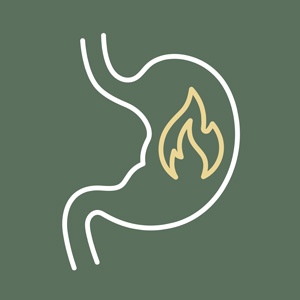Y

ou may be familiar with terms like heartburn or acid reflux. They can be unpleasant to experience, but they are often misunderstood. Contrary to popular belief, they aren't medical conditions—but they can be symptoms of one. Both are often symptoms of a condition called gastroesophageal reflux disease, or GERD.
GERD is a chronic disease, meaning that it can last a long time and become worse if it isn't treated correctly. It develops when food, acid and bile in your stomach move up into your esophagus.
The esophagus is a tube that extends from your throat to your stomach. A muscle at the bottom of the esophagus normally keeps stomach contents where they belong. But if it isn't working correctly, stomach contents can slide backward. This backward movement causes symptoms such as:
• Heartburn (a burning feeling in the chest).
• Regurgitation or acid reflux (the movement of stomach contents into your throat or mouth).
• Nausea.
• Chronic cough.
• Sore throat.
• Hoarseness.
Heartburn and regurgitation are the disease's most common symptoms. Not everyone experiences both of them. GERD symptoms are common, and it might be easy to dismiss them as something that doesn't need medical attention.
However, if they're not treated by a doctor, serious complications could develop, including esophageal cancer. Studies have shown a dramatic increase in esophageal cancer over the past 20 years.
You should contact your primary health care provider right away if you experience any of these problems:
• You take over-the-counter medicine for your heartburn two or more times a week.
• It's difficult to swallow food.
• Acid reflux makes you cough, sound hoarse or feel short of breath.
• You vomit blood or have black or bloody bowel movements.
• You have lost weight but don't know why.
Your provider may recommend that you see a specialist known as a gastroenterologist. The gastroenterologist will perform tests to learn if you have GERD. Treatment options include:
• Lifestyle changes. Avoiding fatty, spicy or acidic foods, as well as tobacco and alcohol, can help. Losing weight, raising the head of your bed and not going to bed until a few hours after eating can also relieve symptoms.
• Prescription medications. Common GERD medications reduce the amount of acid your stomach produces.
• Surgery. If lifestyle changes and medication don't improve GERD, an operation can prevent stomach contents from entering the esophagus.
With proper treatment, the progression of GERD can slow or stop.
Watson Clinic’s
gastroenterology department can help you diagnose and manage GERD, and can offer referrals to our
general surgery department when surgical intervention is necessary. Call 863-680-7490 to schedule an appointment.
Sources: American College of Gastroenterology; Merck Manuals Online Medical Library; National Institute of Diabetes and Digestive and Kidney Diseases